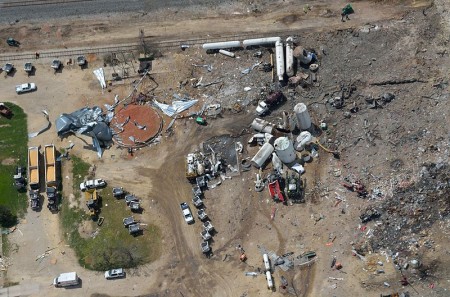Lac-Mégantic tragedy raises issues including St. Lawrence contamination

Map of affected area in Lac-Megantic, QC: Personal Mountains, Creative Commons, no restrictions
This past April, Americans were horrified by a fertilizer plant explosion in West, Texas – which killed 15 and injured close to 160 residents.
Now the small Quebec town of Lac-Mégantic has experienced similar devastation caused by Saturday’s unattended train derailment which caused an explosion of tanker cars carrying crude oil. Concerns exist about the possibility of contamination in the St. Lawrence waterway, with this from the Associated Press reporting on the incident:
Crews were working to contain 100,000 liters (27,000 gallons) of light crude that spilled from the tankers and made its way into nearby waterways. There were fears it could flow into the St. Lawrence River all the way to Quebec City.
Quebec’s Environment Ministry Spokesman Eric Cardinal said officials remained hopeful they could contain more than 85 per cent of the spill.
As would be expected, news outlets in Canada are giving this event intensive coverage, including this from the Montreal Gazette. Here is graphic of the blast zone from the National Post and a timetable of events as reconstructed by CBC.
Some 40 buildings in the center of Lac-Mégantic were blown to smithereens, along with anyone who was too close. As reported in the Toronto Star on Sunday July 7:
One Red Cross volunteer who asked not to be identified because he was not authorized to speak to the media put it bluntly: “You have to understand: there are no wounded. They’re all dead.”

West, Texas chemical plant explosion site, taken a few days after the disaster. Photo: Shane Torgerson, Creative Commons, some rights reserved
By Tuesday morning the death toll stood at 13. With many still unaccounted for (now up to 50), the list of fatalities seems sure to rise.
Recent developments include comments from the head of the train company stating his belief that tampering was involved, as reported by Postmedia News:
“We have evidence of this,” said Ed Burkhardt, chairman of The Montreal, Maine & Atlantic Railway. “But this is an item that needs further investigation. We need to talk to some people we believe have knowledge of this.” A probe by the Transportation Safety Board is underway to determine what caused the company’s parked, unattended train, which included five locomotives and 72 tanker cars, to roll toward the town of 6,000 early Saturday morning with its load of crude oil and derail in the city centre.
The two tragedies also stand as terrible cautionary tales: equivalent events could easily happen in similar towns with chemical plants, or tracks that run through towns.
As if that wasn’t enough danger to digest, the cargo that exploded – oil – brings up all sorts of related debates about fossile fuel reliance and transportation. Here’s more on that from this New York Times article of July 7th:
“We have an explosion of tight oil production in Canada and the United States, and most of it is moving by train,” said Anthony Swift, a lawyer with the Natural Resources Defense Council in Washington. “But this process has happened without due diligence.”
The good news between a pipeline spill and a train spill (if one can call it such) is that tankers contain a fixed amount of oil.
While West, Texas and Lac-Mégantic, Quebec stand as cautionary accidents that should be understood to prevent further disasters, that’s a larger, technical analysis. One which will be debated (or ignored?) for years to come.
Indeed, rail safety has long been up for discussion – including rail safety in Lac-Mégantic before this event – as detailed in this article from the Globe and Mail.
In the present, though, what remains is an actual town in our part of the world, ripped apart by the horror and heartbreak of a terrible, terrible event.
Tags: canada, ecology, Lac-Mégantic, oil, rail safety, transportation








This same sort of tanker runs right through residential districts in Canton, Potsdam etc.
It amazes me that we spend so much time fulminating over cell phone towers Park and unsightly wind turbines, and we have this toxic time bomb running right through the middle of our own communities.
The CBC website has just posted an incredible 10-minute video of the fire and explosions a captured by a local resident. It appears to have been taken from just north of the immediate downtown area. I just can’t imagine what it must have been (and continues to be) like to be a long-time resident of this small town and then witness this!
Here is the link for the eyewitness video Hank mentions:
http://www.cbc.ca/news/canada/montreal/story/2013/07/09/quebec-lac-megantic-eyewitness-video.html
A shocking sight to behold, the fire just rages on and on.
Living near the tracks here in Potsdam, it is indeed alarming to read the markings on the tank cars that pass through every day. We have all the downsides of a railroad….deafening noise at all hours, several dangerous crossings, and toxic defoliant sprayed just a few yards from our homes….and none of the benefits….no passenger service, no connections to other cities, and not a single freight or industrial stop to serve Potsdam in any way.
A bit of balance would be a fair trade for the dangers and annoyances.
From Andrew Revkin’s Dot Earth blog in the NYT:
In case you missed it, the oil was being carried from America’s new oil patch, the Bakken shale fields of North Dakota, to a St. John, New Brunswick, refinery that, according to the owner, Irving Energy, sends more than half of its 300,000 daily barrels of petroleum products back across the border to the northeastern United States.
As I wrote during the Gulf of Mexico oil disaster, as long as we depend heavily on oil, we all “own” a portion of every disaster related to oil extraction, transport or use.
An important article in the Montreal Gazette notes that even as Canada’s conservative leader Stephen Harper conveyed his grief about the calamity, the government was deeply cutting the budget of the agency responsible for safeguarding train transport:
At a time when train shipments of crude oil are expected to skyrocket in Canada, the federal government is cutting funding for Transport Canada, the country’s transportation regulator, by almost 30 per cent, down to $1.5 billion, according to government spending estimates for 2012-13 and 2013-14.
One would hope that, in the face of this tragedy, that gutting of those budgets will end. (Canada is hardly alone in cutting budgets for important government agencies.)
there is always a way to do “it” safely. (drill, transport, refine, use)
but not if “it” means making a profit rather than conquering obstacles, taking responsible actions towards problem solving.
as consumers we are expected to own our share of the guilt; that we perpetuate this abuse of the earth and its resources. but never the proffits
I feel that I as one of billions on this planet, that that oil is part mine. part all of ours.
science and industry’s responsibility is to access it and re-distribute evenly to the world, the real owners.
you don’t get to own a resource because you live over it, invented a use for it, learned the secret to its locked secrets.
everyone on earth pays for every action on this planet anyone makes. but we always are expected to take the lions share of the guilt.
it’s the milk jug scenario all over.
milk is sold in plastic jugs, industry standard. I didn’t come up with the idea.
we buy the milk, and all responsibility is accented on what i’m gonna do with that plastic jug.
tag i’m it.
if you don’t want plastic in the landfill, or burned, stop putting the milk in it.
I think the key is that we get rail going through the Adirondacks.